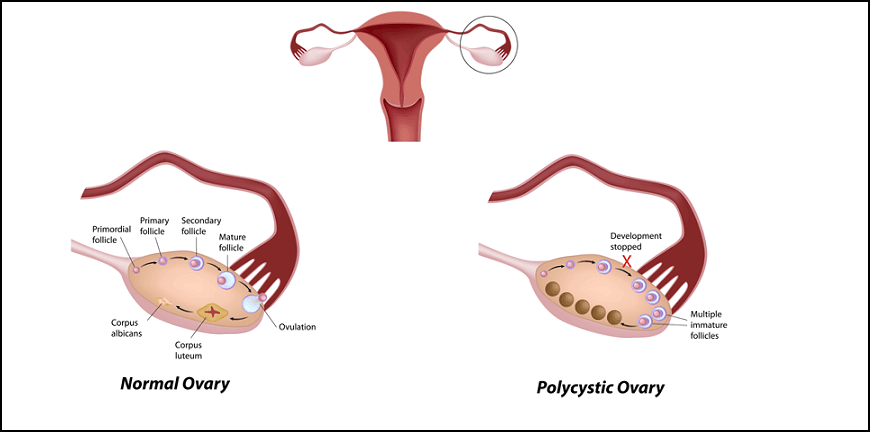Polycystic ovarian syndrome, or PCOS, is a condition in which a woman’s levels of the sex hormones estrogen and progesterone are out of balance. This leads to the growth of ovarian cysts (benign masses on the ovaries). PCOS can cause problems with a women’s menstrual cycle, fertility, cardiac function, and appearance.
What Causes PCOS?
While the exact cause of PCOS is unknown, doctors believe that hormonal imbalances and genetics play a role. Women are more likely to develop PCOS if their mother or sister also has the condition. Overproduction of the hormone androgen may be another contributing factor. Androgen is a male sex hormone that women’s bodies also produce. Women with PCOS often produce higher-than-normal levels of androgen. This can affect the development and release of eggs during ovulation. Excess insulin (a hormone that helps convert sugars and starches into energy) may cause high androgen levels.
Symptoms of PCOS:
Symptoms of PCOS typically start soon after a woman begins to menstruate. The type and severity of symptoms varies from person to person. The most common characteristic of PCOS is irregular menstrual periods. Because PCOS is marked by a decrease in female sex hormones, this condition may cause women to develop certain male characteristics, such as:
Other symptoms include:
While not symptoms of the disease, many women with PCOS have other concurrent health problems, such as diabetes, hypertension, and high cholesterol. These are linked to the weight gain typical in PCOS patients.
How Is PCOS Diagnosed?
There is no definitive test for PCOS. To make a diagnosis, your doctor will review your medical history and symptoms and perform tests to rule out other possible conditions. Your doctor will perform a physical and pelvic examination to look for signs of PCOS, such as swollen ovaries or a swollen clitoris.
Blood tests to measure hormone levels are typically ordered, as well as:
A vaginal ultrasound allows your gynecologist to create real time images of your reproductive organs.
A pelvic laparoscopy is a surgical procedure in which your doctor makes a small incision in your abdomen and inserts a tiny camera to check for size and appearance of your ovaries.
What Are the Potential Complications of PCOS?
Women with PCOS have a higher risk of developing:
Laparoscopic Ovarian Drilling (Ovarian Diathermy) for PCOS :
Laparoscopic ovarian drilling is a surgical treatment that can trigger ovulation in women who have polycystic ovary syndrome (PCOS). Electrocautery or a laser is used to destroy parts of the ovaries. This surgery is not commonly used. But it can be an option for women who are still not ovulating after losing weight and trying fertility medicines. Ovarian drilling is usually done through a small incision (laparoscopy), with general anesthesia. The surgeon makes a small cut (incision) in the abdomen at the belly button. The surgeon then places a tube to inflate the abdomen with a small amount of carbon dioxide gas so that he or she can insert the viewing instrument (laparoscope) without damage to the internal organs. The surgeon looks through the laparoscope at the internal organs. Surgical instruments may be inserted through the same incision or other small incisions in the pelvic area.
What To Expect After Surgery:
If you have a laparoscopy procedure, you will likely go home the same day and can do your normal activities within 24 hours. Your return to normal activities will depend on how quickly you recover from surgery, which may take a few days or as long as 2 to 4 weeks.
Something About Dr. Kapil Kanade:
Dr. Kapil Kanade had already done more than 600 PCOS Surgery Successfully. He has high level of experience in performing successful PCOS surgery all over Maharashtra.
